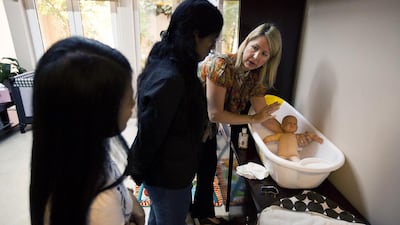DUBAI // Many women lack a clear understanding of the role of midwives in the childbirth process, a conference has heard.
To counter these misconceptions, midwives have called for better education about the support and guidance they provide.
Speaking at the Midwifery Conference in Dubai yesterday, they also urged more Emirati women to enter the profession to develop the scope of midwives’ practices.
“The role of the midwife is poorly understood in Abu Dhabi and likely the rest of the country,” said Treasa Crowley, midwife at Corniche Hospital in Abu Dhabi.
She and Dr Grace Edwards, assistant director of nursing and midwifery clinical specialty programmes at Corniche Hospital, polled 504 patients on their views of midwives.
More than half of respondents said their family would not be happy with only a midwife caring for them during the birthing process. While 66 per cent agreed that midwives were experts in childbirth, one-quarter of participants consistently answered “I don’t know” to the researchers’ questions. More than half said their families would not approve of only a midwife caring for them.
“The overriding theme was, ‘We don’t know what a midwife is,’” said Ms Crowley.
Midwives can offer support and guidance to women that doctors may not be able to provide, said Jasmine Sneyd, who has been a midwife at Corniche Hospital since 1982.
Hospitals tend to follow a more doctor-oriented model such as that in the US, rather than one like in the UK or Europe, where midwives play a more prominent part.
“I think the role of a midwife is to support normal care,” said Ms Sneyd. “It’s all about empowering women to give them the support and knowledge to make their own decisions.”
She said midwives can teach and guide women throughout the birthing process, whereas a doctor is typically trained to deal with complications.
“There is a fear of childbirth. If women remove the fear factor, they can go into birth positively,” said Ms Sneyd.
Mariam Al Gobari said it was at first difficult adjusting to the system at Al Ain Cromwell Hospital, where she works as a senior midwife, after being trained in Jordan.
She contrasted photos of hospital rooms in Jordan with candlelit birthing rooms at Al Ain Cromwell, and said it was at first challenging to respect the woman in labour and “let her be in charge” of various aspects of the process, such as different positions for labour.
“There’s no choice for the woman to say what she wants,” Ms Al Gobari said.
Holistic approaches that midwives can use may also apply to preconception, said Zita West, who has worked for a midwife for 35 years in Oman and the UK, and who founded a midwifery and fertility clinic in London.
She said integrating “everything that is going on in a couple’s lives” with medicine is important to help couples conceive. She said that women having trouble getting pregnant may think it is because they were abused or are scared, or that God is punishing them.
“Many women, they do carry around with them a lot of baggage when it comes to having a baby,” said Ms West.
Dr Mansoura Al Marzooqi, specialist obstetrician-gynaecologist at Al Baraha Hospital in Dubai, said midwives should have higher levels of qualification than nurses. They play a crucial role in the birthing process, particularly in monitoring the foetal heart rate.
“We need midwives to know how important they are to help us in the labour suite,” said Dr Al Marzooqi.
“In some countries, it’s essential in their policies to have a midwife in their personnel staff,” she said.
“In our community, still we don’t have that culture yet.”
lcarroll@thenational.ae

